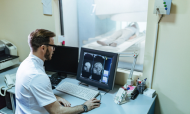
Oncology
Doctors

About the Department
Medical Oncology department team of Malabar Medical College Hospital & Research Centre plays a crucial role in the diagnosis, treatment, and management of cancer. It integrates advanced medical techniques and compassionate care to enhance the quality of life for patients facing this challenging disease. The key functions of the department are Diagnosis and Staging, Treatment Planning, Multidisciplinary Approach, Patient Education and Support, Clinical Trials, Follow-Up Care. etc.
The Medical Oncology department is a cornerstone of cancer care, committed to providing innovative treatments, compassionate support, and comprehensive management of patients throughout their cancer journey, with the expertise of the Best Oncology Doctors in Calicut. As research and technology continue to evolve, the department strives to improve outcomes and enhance the quality of life for all individuals affected by cancer.
Clinical Focus
1. Diagnosis and Staging:
- Medical oncologists are responsible for interpreting diagnostic tests, such as imaging studies and biopsies, to accurately stage cancer. This staging is essential for determining the appropriate treatment plan.
2. Treatment Planning:
- Once a diagnosis is established, oncologists develop personalized treatment strategies. This may involve chemotherapy, targeted therapy, immunotherapy, and hormone therapy, tailored to the individual’s cancer type and stage.
3. Multidisciplinary Approach:
- The department collaborates with other specialties, including surgery, radiation oncology, and pathology, to provide comprehensive care. Regular tumor board meetings facilitate discussion and planning among specialists.
4. Patient Education and Support:
- Educating patients about their diagnosis and treatment options is a key responsibility. The department often provides resources and support services, including counseling and nutritional guidance, to help patients cope with their journey.
5. Clinical Trials:
- Medical oncologists are often involved in clinical research, providing patients access to cutting-edge therapies. Participation in clinical trials can offer new treatment options and contribute to advancing cancer care.
6. Follow-Up Care:
- Continuous monitoring of patients’ post-treatment is vital to assess treatment efficacy and manage any long-term side effects or recurrence of cancer. The department emphasizes survivorship programs to support patients’ ongoing health needs.
Infrastructure
Chemotherapy Unit
The state-of-the-art chemotherapy unit at Malabar Medical College was inaugurated by renowned cancer specialist and MVR Cancer Centre Medical Director, Dr. Narayanan Kutty Warrier.








